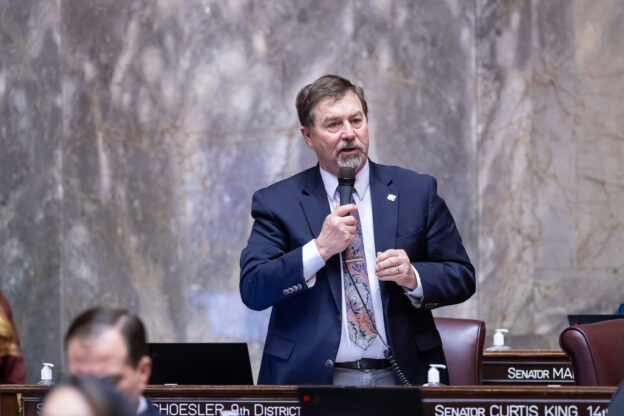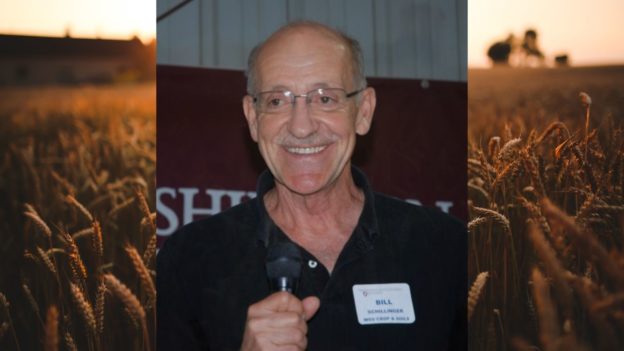The Senate today unanimously approved its version of the 2025-27 state capital budget, with the Republicans who helped develop the spending plan praising it for addressing needs throughout Washington.
“What we have is a capital budget for the entire state,” said 9th District Sen. Mark Schoesler, R-Ritzville, the lead Republican for the Senate capital budget. “We looked at this budget and saw fewer resources, so we made tougher decisions every step of the way, working on priorities that made both our side and our Democrat counterparts happy.
“This budget also leaves healthier reserves than we often have going into the second year of a biennium. When we come back next year, we can address unforeseen problems with those reserves.”
Schoesler’s full remarks prior to today’s vote may be viewed here.
“I’m really pleased with how well the Senate capital budget addresses needs throughout Washington,” said Sen. Perry Dozier, R-Waitsburg. He became assistant Republican leader on the capital-budget team this year, bringing government-budgeting experience from two terms as a Walla Walla County commissioner.
“We all made sure there is a lot of support for K-12 education, which is our state’s paramount duty, but this particular budget is also good for things like water projects, housing and fish hatcheries. That makes sense, if you look at the mix of backgrounds and priorities of the four senators who crafted it. I’m also glad we made progress on addressing some long-standing concerns about support for public-works projects.
“The capital budget has a reputation for being the most bipartisan of the three state budgets, and now I know why. We placed a lot of trust in one another in the course of developing this – each of us tried to be responsive to what the others brought to the table. That shows through in the budget itself and today’s unanimous vote.”
The Senate capital budget has a total price tag of $7.3 billion, with an ending-fund balance of $222 million.
It features $1 billion for K-12 education and early-learning projects, including $563 million for the School Construction Assistance Program. There is $201 million for Small District and Tribal School Modernization construction and planning grants, which will fund 40 additional small-school construction projects. Another $143 million is provided for additional school seismic-safety grants, plus $12 million for the new school security and preparedness infrastructure grants program.
The Senate capital budget spends $770 million on a variety of housing programs.
Schoesler and Dozier, both farmers, noted the state’s fairs benefit from this budget, which allocates a record $12 million for competitive grants to agricultural fairs for access- and safety-improvement projects.
The Senate capital budget also provides plenty of money for water-related needs on both sides of the Cascades, with robust funding for eastern Washington water-infrastructure programs. Those appropriations include $69 million for the Columbia River Water Supply Development Program, of which $44 million goes to the Odessa Groundwater Replacement Program, plus $53 million for the Yakima River Basin Water Supply Program and $13 million for the Yakima-Tieton Canal to start fixing damage to a wildfire.
In western Washington, $80 million is provided to fully fund the Chehalis River Basin Strategy, which includes flood control and salmon recovery.
There is also $85 million in the two-year plan for 15 fish hatcheries statewide – another record.
A total of $1.2 billion is allocated for projects at Washington’s four-year universities and other higher-education institutions. They include:
- University of Washington: $40.8 million for Anderson Hall renovation.
- Washington State University: $25 million for the Sciences Building, plus money for preventive facility maintenance and building-system repairs.
- Central Washington University: $12 million for the emergency backup power system, $11 million for the university’s Humanities and Social Science Complex, and $10 million for an expansion of CWU’s aviation-degree program.
- Eastern Washington University: $10 million for the dental-therapy lab, as well as funding for facility-preservation projects.
- The state’s community and technical college system receives $400 million for various projects.
Once the House of Representatives passes its capital budget, budget writers from the Senate and House will meet as a “conference committee” to hammer out a compromise capital budget for both chambers to consider.
The 2025 legislative session is scheduled to end April 27.















